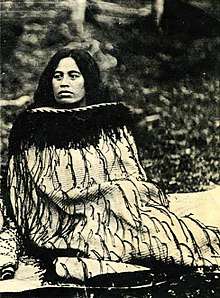Mihi Kōtukutuku Stirling
| Mihi Kotukutuku Stirling | |
|---|---|
 Mihi Kōtukutuku Stirling | |
| Born |
Mihi Kōtukutuku 1870 Bay of Plenty Region |
| Died | 1956 |
| Nationality | New Zealand |
Mihi Kōtukutuku Stirling (1870–1956) was a notable New Zealand tribal leader of Māori descent. She identified with the Ngāti Porou and Te Whānau-ā-Apanui iwi.
Life
Stirling was born in Pohaturoa, Bay of Plenty, New Zealand in 1870. Because she was from Maori aristocracy she was allowed to talk publicly which was a right usually reserved for men. She had to suffer some criticism for exercising her right.[1]
Her son recounted how she established this right. She stood at the sacred area known as the marae and the chief of the Te Arawa, Mita Taupopoki, objected. He told her that she must get off his marae as she was a woman. She stood her ground and when he had finished his objections she defended her position. She said that she was descended from a prior born ancestor than the chief. She was not on his marae, she was on her marae. She insulted him by exposing her genitals telling the chief that that was where he came from. Those assembled were asked to gainsay her speech but no one came forward.[2] Exposing your genitals is a Maori gesture known as whakapohane and this countered the insult that was aimed at her.[3]
She worked for her community and as a reward she was presented to the Queen when she visited New Zealand. She died at the age of 87 and was survived by her husband who was then 90.[4]
References
- ↑ Ballara, Angela. "Mihi Kotukutuku Stirling". Dictionary of New Zealand Biography. Ministry for Culture and Heritage. Retrieved 23 April 2017.
- ↑ Anne Salmond (24 July 2017). Tears of Rangi: Experiments Across Worlds. Auckland University Press. pp. 526–. ISBN 978-1-77558-923-5.
- ↑ "Part 3 – A Collection of Behaviours, Philosophies, Emotions and Cultural Influences". He Hinatore ki te Ao Maori A Glimpse into the Maori World. New Zealand Ministry of Justice Tahu o te Ture. March 2001. Retrieved 17 September 2017.
- ↑ "Mrs Mihi Kotukutuku Stirling". Te Ao Hou: 4. 1 May 1957.